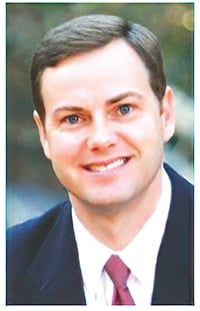Outdoor Life
Opinion
Visitors flocking to state capitol
 By Rep. Trent Ashby
By Rep. Trent Ashby
Representing District 9
This past week, we saw a flurry of visitors from House District 9 as they visited their Texas Capitol to see the legislative process in action. I was pleased to see constituents from Tyler and Houston counties, members from First Baptist Church Livingston, Angelina College, and large group from the Lufkin Association of Realtors. Additionally, I was proud to sponsor a House resolution recognizing the Texas Forestry Association for their rich history and seedling giveaway at the capitol. The seedling giveaway is always a popular event for lawmakers and staff during session and presents an incredible opportunity for their members to talk directly with decision makers about the importance of our state’s forest and wood products economy. If you would like to arrange a visit to the capitol during session, we’d love to arrange that by simply calling our Austin office.
With that, here’s an update from your State Capitol…
This past week, I presented House Bill 1846 to the House Transportation Committee. I filed this bill because Texas, like many other states, is experiencing a shortage of truck drivers who possess a commercial driver’s license (CDL). As the demand for transportation services has increased over the years, this shortage of CDL drivers has wreaked havoc on our ability to move goods and freight around the state and country. This situation has led to higher transportation costs, delayed deliveries, and reduced the overall productivity of the trucking industry. After listening to stakeholders and constituents, I filed HB 1846 to require the Department of Public Safety, or one of its 245 licensed third-party vendors, to provide CDL testing for out-of-state CDL applicants who have passed the written portion of the CDL test in their home state. If this bill passes, it is estimated that we could increase CDL drivers in Texas by 25% over the next few years.
This coming week, the House will consider our first full bill calendar to be voted on in the House chamber. This is a significant milestone as it means from now until the end of session the House will be considering bills on the floor of our chamber. The House Calendars Committee is tasked with developing our daily calendar and it can be viewed online each day on the Texas House of Representatives website. Your voice matters in this process, so if you see or hear of a piece of legislation that you feel strongly about, please don’t hesitate to call or email one of our offices to share your thoughts.
The mobile office is on the road again and we look forward to seeing you on the following dates, in the following locations: April 5 at the San Augustine County Courthouse from 9-11 a.m., April 12 at the Polk County Commissioner’s Courtroom in Livingston from 9-11 a.m. or at the Tyler County Courthouse in Woodville from 1:30-3:30 p.m., April 19 at the Houston County Courthouse Annex in Crockett from 9-11 a.m. or at the Trinity County Courthouse in Groveton from 1:30-3:30 p.m.
As always, please do not hesitate to contact my office if we can help you in any way. My district office may be reached at 936-634-2762 and our capitol office at 512-463-0508. Additionally, I welcome you to follow along on my official Facebook page, where I will post regular updates on what’s happening in your State Capitol and share information that could be useful to you and your family: https://www.facebook.com/RepTrentAshby/.
- Hits: 655
What we’re hearing and what we’re missing
 By Tony Farkas
By Tony Farkas
This email address is being protected from spambots. You need JavaScript enabled to view it.
Bread and circuses is a phrase most commonly associated with the Roman Empire, something that the nation’s leaders gave the masses which distracted them from what’s really going on, or what’s really important.
So in this week’s installment of pathos designed to hide whatever house fire is happening, President Trump most likely will have been arrested and indicted on a charge of something.
The political nature of this is palpable, designed to distract us from the flailing policies of the current administration while at the same time putting the brakes on a possible presidential run by Trump.
So what’s been going on? Pick your problem.
I still read more than one story, and focus on more than one issue when I cruise the news. I found several things, most notably our government taking another swipe at our household appliances.
Yep, here we go again. You remember that President Biden decided that gas stoves are another significant cause to global warming/climate change and detrimental to polar bears, and decided to ban them. Now, your washing machine is evil and must be destroyed, since it uses entirely too much water.
Biden has been pondering an executive order to require all new washing machines to be designed to use half the water of normal machines.
Anyone with a brain will realize that half the water will either mean twice the loads or twice the wash, which also will mean just as much if not more water will be used, and won’t that be just another large load on the already-taxed electrical grid (since you’ll have an electric stove because reasons).
Another one we may be missing is the admission by Hunter Biden that the Biden family receiving payments out of China in 2017, quite a bit in fact — $1.3 million apiece, according to his statements. Unca Joe, however, says that’s not true.
Hunter Biden also filed suit against the owner of the repair shop that released the questionable laptop to authories, claiming it was a violation of his privacy. However, since the shop had a policy of taking ownership of items left after a certain period of time, technically it belonged to the shopkeeper. What’s more interesting in this is Hunter, by filing this suit, has admitted that the laptop actually was his, which up until now he had been adamantly denying.
There also is the nightmare of inflation that still steadfastly refuses to go away; the never-ending war in the Ukraine which the U.S. is financing, at least on the part of Zenlenskyy; COVID vaccines, which have come under fire for being ineffective, are now found to possibly cause disabilities; and the Assistant Trans-Secretary for Health for the U.S. Department of Health and Human Services is claiming that gender assignment surgery should become normalized.
If the government’s role is to protect it’s citizens, and if it truly followed the framework set up by the Founding Fathers, then instead of distraction it would work toward solutions that benefit this country, not others, and solve the political divide through cooperation and communication, not upping the ante through criminal investigations.
Or, as is the case nowadays, swordfights will take the place of presidential elections, and debates will take on a whole new dimension.
- Hits: 522
Another face in the race
 By Horace McQueen
By Horace McQueen
The former mayor of Chester, Texas has entered the race for President of the United States. From reading the information supplied by Floyd Petri when he registered as a presidential candidate, his political platform makes sense—though he certainly knows his will be a losing deal. But at least maybe he can add some common sense to the campaign.
Nestled in Tyler County not far from Corrigan and Livingston, Chester is home to 261 citizens. While mayor he said Chester became the first city in Texas to become a Second Amendment Sanctuary City. Prior to his political role in Chester, Petri said he had a lifelong career in the military and law enforcement. His military service stands in contrast to that of Biden, Trump and most of the other consummate politicians who never wore the uniform. And Mr. Petri can tell his kinfolks in later years that he ran for President!
Last week I wrote about a gigantic solar project that is being negotiated in the Latexo School District. Some folks liked the idea—while some turned thumbs down. If it does become a reality, it would be built on close to 1,000 acres on FM 2022 just north of Crockett. That acreage is a part of the Stalwart Ranch--Attebury Division. Solar farms, regardless of size, have to plan for controlling grass and weeds under the panels. That necessity could well be a boon for a sheep operation. Some brilliant minds suggested goats could roam under the panels. This plan went down the tube when they learned goats would climb atop the panels and also chew on all the wiring underneath. Some solar farms are “renting” sheep along with herders to keep the grass and weeds short. This is already being done in some areas of Texas.
Wood pellets are the number one forest-export product for the U.S. Demand for our pellets comes from the United Kingdom and European Union nations. What was a small industry ten years ago has grown to a $1.5 billion export market from the southern states. And the overseas pellet markets are getting bigger and more profitable for U.S. pellet producers. Until the blowup in Ukraine, that nation along with Russia and Belarus controlled the market in Europe.
Now all eyes are focused on making more pellets from our timber. Let this market grow and hopefully our timber producers will benefit! That’s –30—This email address is being protected from spambots. You need JavaScript enabled to view it.
- Hits: 628
The problem with AI
 By Chris Edwards and ChatGPT-4
By Chris Edwards and ChatGPT-4
ChatGPT’s latest iteration is an advanced language model developed by OpenAI that employs the GPT-3.5 architecture. This iteration has been trained on a vast amount of data to improve its natural language processing abilities, making it capable of understanding and generating more human-like responses. Additionally, it has been optimized for speed, allowing it to process and respond to queries at an unprecedented rate.
The latest version of ChatGPT incorporates state-of-the-art technologies such as self-supervised learning, meta-learning, and transfer learning. These techniques have enabled the model to learn from vast amounts of unstructured data, resulting in a more accurate and contextually appropriate understanding of natural language. As a result, ChatGPT can answer complex questions, generate human-like responses, and even perform language-related tasks such as summarization and translation with a high degree of accuracy.
So, gentle readers, a bit of disclosure to frame this outing: the above two paragraphs were written by ChatGPT’s latest version. I simply entered the prompt “Give two paragraphs that explain ChatGPT’s latest iteration in 70 words or less,” and off to work it went.
Now this column might come as something a bit removed from my jurisdiction, but I’m writing it anyway. By the way, before I get into my rant, good-n-proper, there’s an irony present that, yes, last week I wrote about how awesome Artificial Intelligence (AI) was because it could make all the presidents have mullets and mirrored motorcycle cop shades, but I digress.
Typically, things of a futurist bent, or anything having to do with technology and/or computerized legerdemain is the purview of our Jim-of-all-trades and occasional op-ed page cohort Jim Powers, and I’m sure he could posit a few thoughts on this subject in an even more compelling and cogent fashion, but here goes.
AI-generated writing is already fairly commonplace with certain types of writing. Many businesses and organizations utilize it to create financial reports and even copy for marketing.
The vast amount of data that the current iteration of ChatGPT uses to create prose from user-supplied prompting draws from all manner of sources – from e-books and Wikipedia to blog entries, yet generates something new. This presents a huge problem in the academic world, as anything from freshman composition essays to graduate-level theses can be generated through AI, and standard plagiarism detection methods are futile.
There are scads of users on Reddit who are reporting having used ChatGPT to get near-perfect grades in college classes, and what would traditionally have taken a student many hours, spread over days, of research, reading, drafting and revising can now take 20 minutes. An AI-generated doctoral thesis that made the rounds in the news cycle even included references, citations and annotations.
AI can write well, to be certain, but it lacks the self-awareness and nuance that comes about through stylistic consistency, building upon strengths and perspective of a human writer. This is especially important in endeavors, such as novel and short-story writing and screeds that fill newspaper op-ed pages.
But what about the casual reader who doesn’t really care about certain craft elements? For those readers who think Dan Brown and Fifty Shades of Gray is good writing, AI-generated writing would likely be good enough to fill their literary needs.
One story I cut from my short fiction collection that was released last year is a piece called “Equanimity.” It is a brief character study about a woman working in corrections and counting the days until she is retired from TDCJ, simply so she can enjoy smoking marijuana.
Lately I’ve been re-writing the story a bit to use in another project, and since a draft was on my desk when I began adventuring in AI writing, I decided to feed the plot into Chat GPT-4 and what it spat out was a nearly 600-word piece that was eerily similar to my original story, and even featured a scene with the character’s retirement party described.
So how long is it before AI writing becomes good enough to completely replace human scribes altogether? Our computing speed continues to accelerate, and I’m told the amount of power available to AI is expected to increase 1,000 times over the course of the next five years.
As someone on the margins of the creative community, I’ll say this here and now: AI is a problem. However, for those of us who do bang words out, whether it’s for a living or our own edification/practice, let’s keep writing and honing our craft. The AI might win someday, but we ain’t going down without a helluva fight.
- Hits: 665
Broadband bill to increase infrastructure
 By Rep. Trent Ashby
By Rep. Trent Ashby
Representing District 9
The early return of warmer temperatures means spring is just around the corner.
Driving back to East Texas each week from Austin, I can’t help but to admire the true natural beauty of our region. From the native flowers that dot the landscape to the dogwood blooms that are putting on a show, it’s a great time to be outdoors.
It’s also county fair season for many of our communities. As a proud supporter of our youth involved in FFA, 4-H and FCCLA, I hope you will make every effort to get out and support these students who will be showcasing their projects in the coming weeks.
Always remember that investing in our youth is investing in our community’s success. I hope to see you at the fair.
With that, here’s an update from your State Capitol.
This past week, the Speaker unveiled a number of bills that will be a priority for the Texas House this session. Among the recent list of priorities is a bill I filed, House Bill 9, which would make a historic investment in the expansion and development of broadband infrastructure throughout the State of Texas.
This bill will be paired with a Joint Resolution, HJR 125, which establishes the Broadband Infrastructure Fund as a fund outside the state treasury for the sole purpose of increasing connectivity in Texas.
Together, HB 9 and HJR 125 would distinguish the State of Texas with a bold and ambitious investment in broadband infrastructure funding to increase access and affordability, support critical programs like 911 services and school safety initiatives, eliminate costly fees on customers, and foster greater economic prosperity through a more connected Texas.
Another House priority this session will be on improving our state’s water infrastructure. The legislation, House Bill 10, would create the Texas Water Fund to provide greater financial assistance for rural and underserved communities to enhance water infrastructure.
Similar to HB 9, HB 10 will be paired with a Joint Resolution, HJR 130, to establish the fund.
I applaud the Speaker for making water infrastructure a priority, and I look forward to working with my colleagues in the House to make strides toward enhancing our water infrastructure throughout the state.
Another priority, House Bill 15 would establish the Mental Health and Brain Research Institute of Texas. Under HB 15, the state would dedicate funding to improving brain health research, preventative care, and treatment centers to address our state’s mental health needs.
The bill is paired with HJR 135, which establishes the Mental Health and Brain Research Institute of Texas.
The mobile office is on the road again and we look forward to seeing you on the following dates, in the following locations: March 15 at the Houston County Courthouse Annex in Crockett from 9-11 a.m., or at the Trinity County Courthouse in Groveton from 1:30-3:30 p.m.; April 5 at the San Augustine County Courthouse from 9-11 a.m.; April 12 at the Polk County Commissioner’s Court Room in Livingston from 9-11 a.m., or at the Tyler County Courthouse in Woodville from 1:30-3:30 p.m.
As always, please do not hesitate to contact my office if we can help you in any way. My district office may be reached at (936) 634-2762. Additionally, I welcome you to follow along on my Official Facebook Page, where I will post regular updates on what’s happening in your State Capitol and share information that could be useful to you and your family: https://www.facebook.com/RepTrentAshby/.
Trent Ashby represents District 9, which includes Trinity County, in the Texas Legislature.
- Hits: 770




